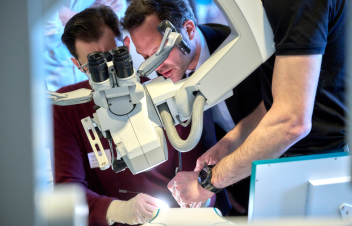Empowering Surgeons: Maximizing Performance through Software Training
- surgeonslab1
- Sep 6, 2024
- 4 min read

Medicine is one of the most dynamic fields, and the development of surgical skills is continuous through learning and processes of adaptation driven by changes in technology. Surgical training software complements the residency programs as one of the most important approaches towards further improving surgical performance.
This article reviews the impacts of surgical training software on neurosurgery residency programs, with emphasis on its role toward surgeons' empowerment and optimization of their performances. With proper tools and proper training, the surgeons would, hence, keep improving in their abilities and professional competence, leading to improved patient outcomes.
The Need for Surgical Training Software
For years, a traditional surgical residency has remained the academic backbone of any surgeon's experience. Surprisingly, modern technologies fuel fast health needs. They create a gap that needs filling. Such software for surgical training does that job along with opening several related benefits:
Improved learning: This indeed opens a bright route to learning with augmented learning. Surgical Training Software lets residents train their surgical skills. It uses real-time simulations and step-by-step instructions in a controlled setting. This enhances conventional hands-on training and helps them better understand surgical techniques.
Standardization of Education: The residency programs throughout the world vary in what and how they teach the residents. The surgical training software aims to standardize residents' learning. It ensures they all have access to the same high-quality resources. Such consistency could translate into better patient care and superior surgical outcomes.
Flexibility and Accessibility: Surgery residents often have grueling schedules, and traditional classroom teaching is occasionally impractical. Training software is flexible. It lets residents choose when and how fast to interact with the training material. This facilitates self-directed learning and accommodates different learning styles.
Cost reduction: The use of surgical training software could save a residency program a significant amount of money. It cuts the need for costly physical resources and supplies. It eases the strain on limited funding, without lowering education quality.
Neurosurgeons: Embracing Technology for Better Patient Care
Neurosurgery is a highly specialized field requiring extraordinary skill and precision. The integration of surgical training software into neurosurgery residency programs offers several benefits:
Complex Procedure Practice: This implies intricate and delicate neurosurgery, often with critical structures of the brain and spine. Surgical training software would give them a non-threatening environment to simulate just these types of procedures, allowing residents to safely hone their budding skills before beginning their work on actual cases.
Exposure to Cases Not Otherwise Seen: Neurosurgeons are exposed to very rare pathologies and complex cases that they would rarely have encountered during their residency training.
Competency Assessment and Feedback Systems: Neurosurgery residency programs may adopt surgical training software at their disposal that assesses where an individual resident's competency stands in specific areas individually.
Surgical Tech Training: Empowering the Support System
Behind every successful surgeon, there is a hardworking team of surgical technologists in the operating theatre. That is why investment in surgical technician training is equally important as that of the training of surgeons themselves:
Effectiveness and Precision: Surgical techs are crucial in the operating room. They ensure cleanliness, prepare tools and help surgeons. Their careful work is key to successful surgeries and patient safety. These experts are vital members of the surgical team.
Teamwork and Communication: Software for surgical simulation plays a very crucial role in teamwork in the operating room, as well as communication. Surgical simulation helps technicians understand what is expected from a surgeon during any given simulation; this helps them to effectively anticipate problems that might occur during actual surgeries.
Continuous Professional Development: Most surgeons have to undergo continuance training; surgical technologists are no exception. Whatever the training software applied, it should be accessible and comprehensively capable of enabling the surgical technician to develop continuously, thereby improving the result of the whole surgical team.
SurgeonsLab: A Revolutionary Surgical Training Software
SurgeonsLab represents the breakthrough innovation online and renews the face of surgical training. It includes web-based surgical simulation software with modules ranging from neurosurgery and orthopedics to endoscopy, among others. Thus, here is how SurgeonsLab empowers surgeons and maximizes performance:
Immersive Simulations: Advanced graphics, combined with sophisticated simulation technologies, create hyper-realistic scenarios of surgical situations. They aim to closely simulate the challenges of a real operating room. So, they offer an unmatched training opportunity.
Customizable Curriculum: Another salient feature of SurgeonsLab is its ability to adapt to different educational pathways. The platform lets residents and surgical techs customize their curricula to fit their needs. This approach lets trainees focus on the most relevant techniques and skills for their future careers. It ensures personalized training.
Evidence-Based Content: SurgeonsLab scenarios are not created "out of thin air." They are made by top medical experts and organizations. That is how all the content is evidence-based. It reflects recent findings and improvements in surgical methods.
Performance Assessment: SurgeonsLab provides detailed performance metrics and feedback on every simulation conducted. The trainees can, therefore, evaluate performance for strengths and weaknesses. Such reflection helps improve programs. It also aids program directors in monitoring resident development.
Ending Remarks
Surgical training software is vital. It equips surgeons and boosts efficiency. Immersive simulations with customized curricula can help residency programs. They can improve both surgeons' and surgical technologists' skills for better patient care.
The benefits of surgical tech training are clear. Its use in neurosurgeons' residency curricula is a big step toward preparing them for their delicate, complex profession. With advances in technology and a push for better surgical training, we can expect more innovative solutions. They should add more value. They are key to improving surgical care.







